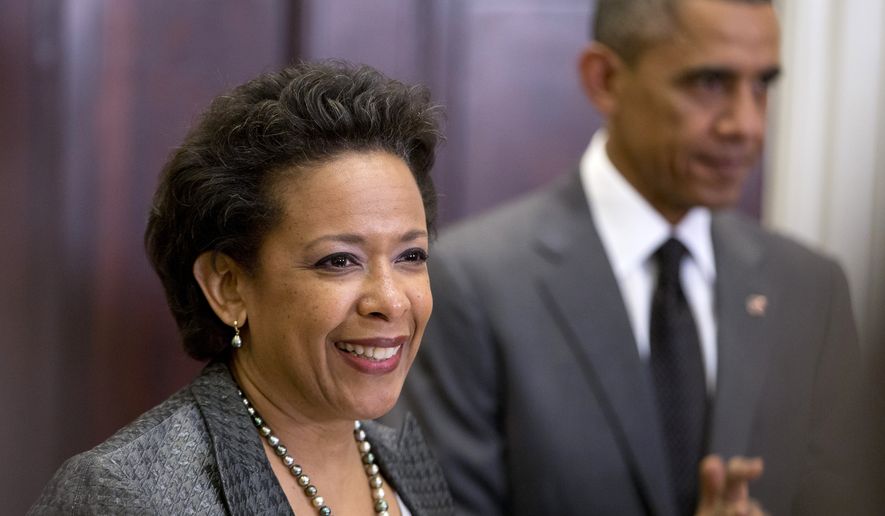Democratic attorneys general have a history of meddling in politically sensitive cases, the official record shows.
Those include Justice Department interventions under Eric H. Holder Jr. in a voter intimidation case, Loretta E. Lynch in the Hillary Clinton email scandal, and Janet Reno on possibly illegal campaign fundraising calls by President Clinton and Vice President Al Gore.
Attorney General William P. Barr is under fire from Democrats for intervening in the sentencing of convicted perjurer Roger Stone, a longtime friend and former political adviser to President Trump. Mr. Barr told the D.C. U.S. attorney’s office that its prosecutors’ recommendations of seven to nine years in prison was too severe. He told ABC News that he thought he had an agreement for non-recommendation at sentencing by a U.S. District Court judge, an Obama appointee.
More than 1,100 former Justice Department prosecutors and officials have signed a letter demanding Mr. Barr’s resignation over his handling of the Stone case.
As a former attorney general, Mr. Barr once intervened with the Trump Justice Department to discourage the prosecution of a Democrat, Sen. Robert Menendez of New Jersey, on charges he accepted gifts from a supporter in exchange for political favors.
Previous attorneys general or their political appointees also have intervened in cases that appeared to help the Democratic Party.
One of the Justice Department’s first actions under Mr. Holder in 2009 was to intervene in a Justice civil suit against the New Black Panther Party.
The department’s Obama appointees dropped a case of voter intimidation against two Black Panthers who patrolled a Philadelphia polling place in paramilitary uniforms, one wielding a club.
“Incredibly, after the case was dismissed, instructions were given that no more cases against racial minorities like the Black Panther case would be brought by the Voting Section,” wrote J. Christian Adams, who resigned as a voting rights attorney at Justice, in a Washington Times column.
In 2012, a District Court judge ruled, “The documents reveal that political appointees within DOJ were conferring about the status and resolution of the New Black Panther Party case in the days preceding the DOJ’s dismissal of claims in that case, which would appear to contradict Assistant Attorney General [Tom] Perez’s testimony that political leadership was not involved in that decision.”
Mr. Holder famously referred to himself as Mr. Obama’s “wing man.” He also labeled America as a “nation of cowards” when it comes to race.
Former FBI Director James B. Comey testified to Congress that Ms. Lynch instructed him to refer to the investigation into former Secretary of State and Democratic presidential candidate Hillary Clinton’s email abuse as a “matter,” not a criminal investigation. Mr. Comey said the characterization was the same as the one used by the Clinton camp.
Ms. Lynch held a meeting with Mr. Clinton in her aircraft at the time his wife was under investigation. A new book, “Secret on the Tarmac,” asserts the meeting at the Phoenix Sky Harbor airport on June 27, 2016, was planned, not a chance encounter.
A few days later, Mrs. Clinton, with a number of aides at her side, sat down for an interview with FBI agents.
Mr. Comey usurped the Justice Department and unilaterally announced in July 2016 that Mrs. Clinton would not face charges for storing classified State Department emails on her home computer server. Later, the Justice Department inspector general cited Mr. Comey for insubordination.
In 1997, Reno overruled FBI Director Louis J. Freeh and decided not to appoint an independent prosecutor to investigate possibly illegal campaign fundraising calls made by Mr. Clinton, then president, and Mr. Gore, his vice president.
Her decision left Mr. Gore unencumbered by an independent counsel as he ran for president.
Mr. Freeh said Ms. Reno misinterpreted the federal law about when to appoint an outside investigator.
Mr. Barr testified during his Senate confirmation hearing in January 2019 that he called then-Attorney General Jeff Sessions and Deputy Attorney General Rod Rosenstein to oppose the Menendez prosecution.
“I thought the prosecution was based on a fallacious theory that would have bad long-term consequences. And so I freely weighed in at the department, and I did so because I care about the rule of law,” Mr. Barr said.
Mr. Menendez voted against Mr. Barr’s confirmation, as did all but three Democrats.
The Menendez trial ended in a hung jury. The Trump Justice Department did not try the case again.
Brett L. Tolman, former U.S. attorney for Utah on a nomination by George W. Bush, told The Times that conferring with Washington is “not routine. But also not out of the ordinary. I had a few cases where I had meetings with the main Justice deputy attorney general and attorney general on big cases.”
• Rowan Scarborough can be reached at rscarborough@washingtontimes.com.




Please read our comment policy before commenting.